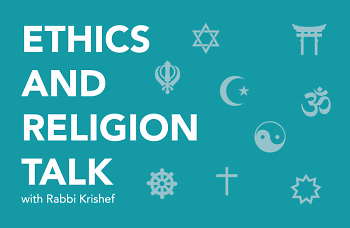A reader of Ethics and Religion Talk asks, “What does it look like to engage in multi- or interfaith dialogue?”
[Note from Rabbi Krishef: We are fortunate to have the Kaufman Interfaith Institute housed at Grand Valley State University, whose goal is to build a community of interfaith engagement in West Michigan. Through programs, community service projects, and weekly communications, it encourages interfaith conversation, learning, and cooperation in our community.
I created this column in order to demonstrate a kind of respectful interfaith dialogue, in which a panel of clergy from different traditions interact with the questioner and with each other with both openness to learning and with strength of personal convictions. Below are three responses to the question. In a few weeks, we’ll publish four more responses.]
Fred Stella, the Pracharak (Outreach Minister) for the West Michigan Hindu Temple, responds:
“There are many ways in which people can engage in interfaith events. Dialogue is often the 1st step. To do so one must be more ready to listen than talk. A genuine sense of spiritual and intellectual curiosity should be brought to the table. Also important is a sense of dispassion. We cannot anticipate or predict outcomes.
“What’s important is that the people engaged comprehend that what they are learning about the other is most often the key element in their lives that provides a moral compass, a transcendent worldview, a social order and a way of living that makes sense. You might not agree with the creeds, rituals, supposed history that are incorporated in that faith, but a sense of respect should be engendered.
“One pitfall to be avoided is to assume that the person with whom you are engaging might represent an entire religion. This should be obvious. Another concern for many is the rare occasion when there is a hidden agenda on the part of some involved. I was in a dialogue group years ago and found this to be the case. One person was participating for several months before he admitted that he was using the experience as a case study. It turns out his motives were not in line with the rest. Unfortunately, the group did not survive this breach of trust.”
The Reverend Colleen Squires, minister at All Souls Community Church of West Michigan, a Unitarian Universalist Congregation, responds:
“I think this work begins with a healthy conversation that helps to educate one another about each other’s religion; to both teach and to learn. In most interfaith work we begin by finding where we share common ground, this at times can blur the lines and we become lost in who we clearly are as different religions holding different beliefs.
“I would offer another approach to note what we hold important and what sets us a part. We could look at the work of a Religion scholar Stephen Prothero who believes that different religions are responding to different problems. For example, Prothero’s sees Christianity’s problem is Sin and the solution is Salvation. Hinduism the problem is Sumsara (Cycle of life, death, and rebirth/reincarnation) and the solution would be Moksha (Spiritual liberation of soul from bondage of reincarnation). Buddhism’s problem is Suffering and the solution is Nirvana. Judaism’s problem is Exile and the solution is Returning to God. For Islam the problem is Pride and the solution Submission to Allah. Prothero even lists Atheism’s problem as Religion and the solution is Reason. I would add the problem for Unitarian Universalists is Oppression and the solution is Justice. I realize this is an over simplification of each religion but it would be the starting point of the first conversation.”
Chris Curia, the Director of Youth Ministries at Fairway Christian Reformed Church, responds:
“Interfaith dialogue requires us to develop deep listening skills and continually take the posture that everyone has something to teach and be taught. Perennial philosophy, which cannot be dismissed as mere syncretism, refers to this concept of shared universal truth, namely why so many people across religious traditions share similar wisdom teachings. We often get so caught up in defining the wells of our religious traditions that we forget the Source, the Ground of Being, from which these great teachings, the water, has come.
“To seek out common teaching across traditions inevitably leads us to affirm one another’s common humanity. What’s more, as we identify the connective tissue between our religious traditions, all of us develop clearer vision for collective consciousness. And as we take steps towards making inter-religious dialogue more reconciliatory in nature, we would do well to avoid what I call religious colorblindness. This approach to seeking out common ground actually devalues diversity and invalidates the struggles of folks at the margins of society.
“The purpose of any dialogue, especially interreligious, must always be to divert power and attention from the privileged to the oppressed. Most religious traditions invite their adherents to grow in a shared concern for the overlooked and downcast, especially if we hold any sort of power because of what we believe.”
This column answers questions of Ethics and Religion by submitting them to a multi-faith panel of spiritual leaders in the Grand Rapids area. We’d love to hear about the ordinary ethical questions that come up in the course of your day as well as any questions of religion that you’ve wondered about. Tell us how you resolved an ethical dilemma and see how members of the Ethics and Religion Talk panel would have handled the same situation. Please send your questions to
[email protected].
The Rapidian, a program of the 501(c)3 nonprofit Community Media Center, relies on the community’s support to help cover the cost of training reporters and publishing content.
We need your help.
If each of our readers and content creators who values this community platform help support its creation and maintenance, The Rapidian can continue to educate and facilitate a conversation around issues for years to come.
Please support The Rapidian and make a contribution today.
